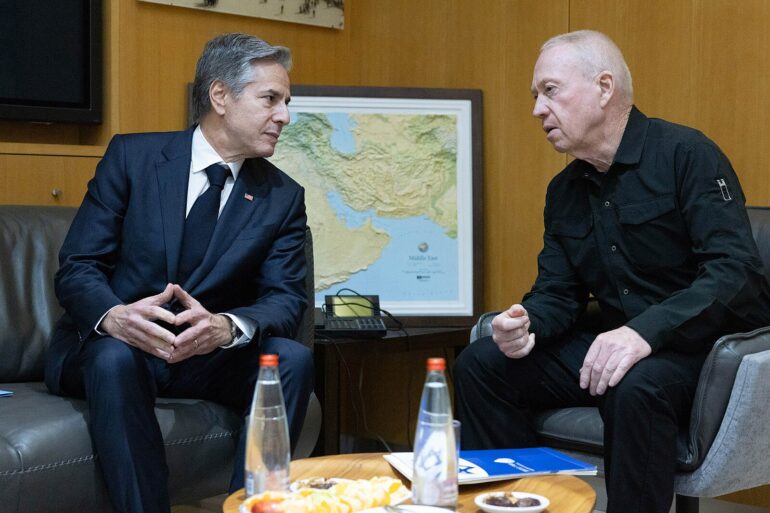On May 12, IDF Chief of Staff Lt-Gen Hertzi HaLevi broke protocol by criticizing Israel’s government, claiming that without a public plan for administering the Gaza region after the war the IDF would be forced to repeatedly raid areas that had been “cleared” in previous operations.
Instead of a reprimand, HaLevi received support from the Minister of Defense, Maj-Gen (res) Yoav Gallant, a rival of Prime Minister Binyamin Netanyahu for leadership of the Likud, who went so far as to threaten resigning last Thursday if the government insists on Israeli military control in Gaza as its plan for “the day after.”
As Likud lawmakers and other members of the coalition challenged Gallant and called for his resignation, Lt-Gen (res) Benny Gantz – war cabinet minister and Netanyahu’s main challenger for the position of prime minister (who had recommended HaLevi’s appointment while serving as defense minister) – came to the defense minister’s defense.
Gantz went even further on May 18, threatening to resign from the cabinet if a plan wasn’t put in place for, among other things, establishing an American-European-Arab civil administration for Gaza and advancing a normalization agreement with Saudi Arabia.
White House correspondent Barak Ravid has meanwhile reported that a senior United States official told him that “We [the US administration] share the Minister of Defense Gallant’s concern that Israel has not developed any plans for holding and governing territory the IDF clears.”
Since early in the war, US President Joe Biden and Secretary of State Anthony Blinken have pushed Netanyahu’s government for a “day after” plan, insisting that the American-backed Palestinian Authority govern Gaza following the war. But Netanyahu’s resistance to committing to any plan, coupled with a refusal to allow the Fatah-led PA to take control of the territory, has led Washington to fear Israel plans to retain a longterm military presence after the war.
A permanent Israeli presence in Gaza would be a disaster for the US empire, essentially reversing its Gaza Disengagement policy that then President George W. Bush forced on Israel in 2005. The fact that many Israelis today understand the folly of the Disengagement and see no viable alternative to a longterm military presence in Gaza (with some even calling for the rebuilding of the Jewish communities that were destroyed in 2005) causes visible concern within the Biden administration.
Enter the ‘Security Experts’
One of the ways Washington has attempted to thwart what Biden and Blinken fear may be Netanyahu’s ultimate war aim is to enlist Israeli generals, past and present, to cloak US demands in the language of Israeli security interests. Because there has long been a culture amongst the IDF top brass (and Israel’s leading journalists) that sees a close relationship to Washington as Israel’s foremost national interest, this involves no conscious treason on the part of the generals in question. Any collusion with the Americans behind Netanyahu’s back is genuinely deemed to be in Israel’s best interest.
The public has therefore been presented with a slew of generals and former generals either explicitly or implicitly accusing Prime Minister Netanyahu of irresponsibly using the war for his own domestic political interests – all with an eager megaphone from Israel’s pro-West mainstream press.
The question we need to ask in light of all of this is whether it’s more likely that Netanyahu and his allies in the current coalition are out of touch with the nation’s security needs or if Israel’s senior generals – past and present – are lining up with the Biden administration’s blatant attempts to topple the Netanyahu government and partition the land into two separate states?
In December 2022, Vision Magazine reported that before taking the reins as IDF chief of the staff, Hertzi HaLevi had made a precedent-shattering visit to Washington. This barely made headlines at the time and has been almost completely forgotten since. But as current and former generals are increasingly parroting messaging from the White House, a closer examination may be in order.
On October 3, 2023, just a few days before the Simḥat Torah massacre of October 7, Gantz (an opposition lawmaker at the time) made an under-the-radar trip to Washington and met with US National Security Adviser Jake Sullivan and Vice President Kamala Harris, ostensibly to discuss American efforts to advance normalization between Israel and Saudi Arabia.
On March 3, this time as a member of the war cabinet but against the wishes of Prime Minister Netanyahu, Gantz made another trip to Washington, breaking parliamentary protocol to meet again with Sullivan and Harris, as well as Secretary Blinken and Senate Majority Leader Mitch McConnel (R).
Not to be outdone, Gallant, who in August of 2023 flew to Washington to meet with lower-level officials in the Department of Defense after Netanyahu reportedly barred ministers from such high-level meetings, flew again on March 24 – this time to meet with Sullivan, Blinken, and Secretary of Defense Lloyd Austin in a more official capacity.
The larger picture that emerges from all this is that Generals Gallant, Gantz, and HaLevi all seem to be in full agreement on a vision for Gaza’s future that flies counter to the position of the government and have a clear track record of breaking precedent and protocol to meet with the US administration against the wishes of the sitting prime minister.
But how deep does this go?
The Indicative Story of Gadi Shamni
The strong connection between Washington’s political and military establishment and the IDF’s top commanders is nothing new. One of the most blaring examples is former IDF attaché to Washington and commanding officer of Israeli Central Command, Maj-Gen (res) Gadi Shamni.
Shamni recently made headlines for declaring in a May 11 interview that the IDF invasion of Rafah was a primarily political decision by the Netanyahu government rather than a military necessity. This harsh accusation came on the tail of Biden’s May 8 ultimatum that he would not supply weapons for an Israeli invasion of Rafah, to which Prime Minister Netanyahu responded that Israel would fight alone with our fingernails if necessary.
What’s so interesting about Shamni’s May 11 statement on Rafah is that it contradicts an earlier statement he made on January 27, when he insisted that conquering Rafah was an absolute necessity for Israel in order to control the Philadelphi corridor and curtail Hamas’s ability to resupply arms from Egypt. At that time Shamni stated that the IDF would have to take Rafah regardless of Egypt’s refusal to accept Gazan refugees into the Sinai.
In order to understand this strange about-face, it is critical to examine Shamni’s career – in particular, his deep connections with the US military establishment.
As a young officer, Shamni was one of a select number of IDF officers to attend the US Green Berets’ elite Q Course in which the US Army’s special forces are trained for unconventional warfare at Fort Bragg.
After completing the course, Shamni was sent to Lebanon to take part in Operation Peace for Galilee as a newly promoted company commander. He recalls that more than learning new techniques, the American course shaped his way of thinking about complex operational scenarios.
Shamni later spent time at the US Army War College, befriended US General John Allen while serving as commanding officer of Israel’s Central Command, and then served as Israel’s attaché to Washington before retiring from the IDF in 2012.
In 2013, Shamni showered the disgraced General Allen with praise for his understanding of Israel’s security needs and the complexities of the West Bank, just as then US President Barack Obama and his Secretary of State John Kerry put Allen in charge of a working group of military experts aimed at formulating a plan for Israel to surrender the territory.
Shamni also led a delegation of former Israeli generals to meet with Obama’s special envoy to the Middle East and former Clinton administration ambassador to Israel, Martin Indyk, to continue work on the plan, which the Israeli government eventually rejected.
After that failure, Shamni and a group of fellow retired generals founded the “Commanders for Israel’s Security” group to promote the Saudi-led Arab Peace Initiative, which gained American support in calling for a full withdrawal from all territories Israel conquered in 1967 in exchange for normalization with the Arab world.
In 2016, Shamni, along with Ilan Goldenberg, chief of staff of Kerry’s efforts towards permanent status negotiations between Israelis and Palestinians, and Colonel Kris Bauman, General Allen’s chief of staff during those same negotiations, published “A Security System for the Two State Solution,” which pushed for Israel to accept the Arab Peace Initiative, and begin steps towards full withdrawal, with American forces securing the Jordan valley and American guarantees to soften unilateral steps taken by Israel towards what Shamni saw as the ultimate goal – separation from the Palestinians.
Shamni later supported the Trump administration’s Deal of the Century, which sought to impose a “two-state solution” on Israel.
Without a doubt Gadi Shamni’s career, in the IDF and in the private sector, were heavily influenced by his close relations with the US military and political establishments. From his position in Central Command to his participation in Commanders for Israel’s Security, he has advanced a series of variations of partition proposals, insisting on the importance of decoupling Israel civilly and militarily from the West Bank and Gaza.
Shamni’s story may seem an extreme outlier at first. But a survey of his peers, other generals with similar backgrounds, indicates a much deeper trend.
A Deeper Trend
A year before Shamni was sent to the Green Berets’ Q Course, Benny Gantz completed the elite training, and he too served as attaché to Washington later in his career.
Gantz also studied at the American National Defense University (as did HaLevi) before eventually being appointed IDF chief of staff. His nomination was the result of current defense minister Yoav Gallant’s appointment being canceled (more on that later). While he is less aggressive than Shamni in advancing a “two-state solution” in the West Bank, as defense minister he approved extensive construction by the US-backed Palestinian Authority in Area C (under Israeli civil and military control) while limiting Jewish construction in the same areas. It’s also noteworthy that his insistence on avoiding Israeli control over Gaza after the war is absolute.
Gallant, for his part, has a more complicated role in the story. Despite his impressive career, he was never educated in the United States or posted overseas. Regarding the West Bank, he seems to firmly support limited Israeli construction while opposing PA building in Area C. So if he’s not tied to the Americans, and not committed to the two-state paradigm, why is Gallant so decidedly opposed to an even limited Israeli administration in Gaza?
From 1997 to 1998, Gallant commanded the Gaza Division of the IDF, shortly after the Gaza-Jericho agreement that allowed Yasser Arafat to enter Gaza as President and Prime Minister of the Palestinian National Assembly, the commander of the Palestine Liberation Army and the speaker of the Palestinian Legislative Council. Later, Gallant was made military secretary to Prime Minister Ariel Sharon, a position which he held throughout the Gaza Disengagement.
After finishing this role shortly after the Disengagement was completed in the summer of 2005 (he was succeeded as the prime minister’s military secretary by Shamni), Gallant was appointed commanding officer of the Southern Command, making him responsible for IDF security arrangements around the recently-abandoned Gaza region, and the military response as Hamas took over Gaza, including Operation Cast Lead in 2008-9. Under pressure from Chief of Staff Gabi Ashkenazi, Gallant established a precedent of heavy reliance by the Southern Command on the Air Force to carry out precision attacks on Hamas rocket launchers that endangered Israeli civilians in the Gaza Envelope, and of limited operations to strike hotbeds of Hamas activity.
Also approved by the government to replace Ashkenazi as chief of staff, Gallant’s appointment was overturned largely due to allegations of building of an unauthorized access road to his home and planting an olive grove on public land outside the boundaries of his property in Moshav Amikam. Gantz was then promoted to the role of chief of staff in his place. Despite the official reason for not being given the job, Gallant has maintained that Ashkenazi was ultimately responsible for the revocation of his government appointment, largely due to disagreements between the two over how to handle the threat from Hamas.
Gantz played his part loyally, and led Operation Pillar of Defense (2012) as a fairly limited engagement, necessitating the broader Operation Protective Edge only two years later, especially due to the military’s understatement of the danger of Hamas’s terror tunnels according to a report by the state comptroller. But while broader than Pillar of Defense, Protective Edge also fell far from destroying Hamas’s military capabilities – especially after the Obama administration urged restraint, saying “we are hopeful that Israel will continue to approach this process in a way that minimizes civilian casualties and that all of us are working hard to return to the ceasefire that was reached in November of 2012.”
Through all of this, Gallant had to watch from the sidelines, exiting the IDF after the cancellation of his promotion and banned from politics due to a legally mandated “cooling off” period for retired generals.
Gallant then climbed the ranks of Israel’s political leadership, first in the Kulanu party and then as a serious contender within the Likud, receiving third place in the 2022 primaries and securing the post of defense minister in the coalition negotiations. For him, this must have felt like a moment of personal redemption, assuming civilian control of the military over a decade after losing the role of chief of staff.
After mass protests and calls by reservists to refuse to serve in response to the government’s judicial reform policy, Gallant called to halt the legislation on March 25, 2023. He was harshly criticized by members of his party for pushing for the government’s capitulation to the pressure from protest organizers. He was fired by Prime Minister Netanyhau but later restored to his post following mass protests in support of Gallant (led by many of the same organizations calling for insubordination).
Enter US General Mike Kurilla
As Commanding Officer of CENTCOMM, there’s nothing unusual about US General Mike Kurilla meeting with Israel’s defense minister. But for Gallant, with exceptionally limited exposure to the Americans until now, their encounter seems to have presented a unique opportunity.
In a July 26 meeting, Gallant assured Kurilla that despite the protests and the apparent extremism of the Israeli government, the Likud base and the Israeli public as a whole were centrist, freedom-loving friends of US objectives for the region. The implication was clear – with American support, a unity government replacing the Netanyahu government’s extreme elements with more pro-West alternatives could be a stabilizing force in the region to advance US interests. Gallant’s aforementioned trip in August, only a month later, to meet officials in the US defense department seems to indicate that Kurilla liked what he heard.
And so, following Simḥat Torah massacre of October 7, Gallant led the push to bring Gantz and his party into a unity government to form a special war cabinet. Gantz had worked with Kurilla in his capacity as defense minister in the previous government.
In light of their public statements over the last week, it’s clear that Gallant, Gantz, and HaLevi have all led the war effort with goals that differ significantly from those of Israel’s elected government. With American prodding, these generals are shirking responsibility for the IDF’s failure to achieve its war aims in an attempt to once again advance Washington’s two-state agenda.
19 years after the disastrous Sharon government’s decision to unilaterally abandon the Gaza region, and 30 years after the PLO was given autonomy over Gaza – decisions which have led to thousands of deaths for Israelis and tens of thousands for Palestinians – Gallant, Gantz, HaLevi, and the Americans are betting our future on the blind hope that this time will be different.
With a broad network of support, in the IDF and in civil society protest movements led by their fellow former generals, these American-backed “security experts” are trying to lead Israel towards a partition policy that would divide the country into two neighboring states, each dependent on the Americans while locked in eternal conflict.
Addendum – Israeli Generals to keep an eye on:
IDF Generals who received the American Legion of Merit Award:
- Benny Gantz
- Gadi Eisenkot – Military Secretary to the Prime Minister during the IDF retreat from Southern Lebanon, Chief of Staff after Gantz and member of his party
- Gabi Ashkenazi – Gantz’s predecessor who Gallant blames for his dismissal, former member of Gantz’s party
- Moshe Yaalon – former Chief of Staff, former political rival to Netanyahu within the Likud and later member of Gantz’s party, defense minister who recommended Eisenkot’s appointment, vocal opponent of the judicial reform
- Mickey Edelstein – Gaza Division commander during Pillar of Defense and Protective Edge, former IDF attaché in Washington, appointed to lead the IDF inquiry into the operational response on Simḥat Torah in Beeri
- Ehud Barak – Chief of Staff during the Oslo Accords, longtime political rival of Netanyahu, supported by the Clinton administration in his campaign for Prime Minister as Labor chairman, responsible for the retreat from Southern Lebanon in 2000, received millions of dollars for research for the Wexner Foundation, leading figure in the protests against the judicial reform
IDF Generals who served as attaché in Washington
- Benny Gantz
- Mickey Edelstein
- Gadi Shamni
- Dan Harel – Witness against Netanyahu in the Submarine Affair, former member of Tel Aviv Mayor Ron Huldai’s political party, and vocal opponent of judicial reform
- Amos Yedlin – Graduate of the Harvard Kennedy School, former member of President Buji Herzog’s party
- Yisrael Ziv – personal assistant to attache Ori Simḥoni, involved in spreading false rumors that the Hamas attack was caused by the IDF redirecting forces to Hawara, joined Gantz and Gallant’s calls for a political plan for “the day after” and called recently to start wrapping up the war
- Yehuda Fuchs – current commanding officer of Israel Central Command, heavily criticized for his use of administrative detention against Jews in the West Bank and politically motivated demolitions of Jewish homes
Graduates of the Wexner Foundation at Harvard’s Kennedy School of Government
- Amos Yedlin
- Aviv Koḥavi – IDF Chief of Staff before HaLevi, holds masters degrees in public administration from Harvard and in international relations from Johns Hopkins
- Yair Golan – former chairman of Meretz party, running a campaign to lead the Labor party, leader in the protests against judicial reform
- Noam Tivon – co-founder of “Defensive Wall for Democracy” which opposed the judicial reform and of “The Combat Soldiers’ Forum for Equally Sharing the Burden” which pushes for enlisting Haredim, involved in spreading false rumors that Hamas’s Simḥat Torah attack was caused by the IDF redirecting forces to Hawara
- Ami Ayalon – former Shabak head, former lawmaker for the Labor party, senior fellow at the Israeli Democracy Institute, vocal supporter of the JCPOA (Obama’s Iran Deal), referred to Ministers Itamar Ben-Gvir and Betzalel Smotrich as “terrorists” in an interview with Al-Jazeera during the current war and called for the release of Fatah terrorist Marwan Barghouti in a hostage exchange
- Yehuda Fuchs
- Ori Gordin – current commanding officer of Northern Command
- Yaron Finkelman – current commanding officer of Southern Command
- Amir Barak – current deputy Chief of Staff





